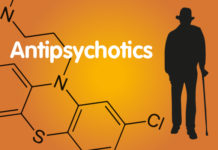Study Shows Clozapine Can Result in Serious Gastrointestinal Complications
A large observational study published in CNS Drugs sheds light on serious adverse effects of the ‘gold standard’ antipsychotic Clozapine.
More Evidence That Antipsychotics Shrink the Brain
European researchers who reviewed 43 imaging studies of first-episode psychosis found evidence that antipsychotics cause a decrease in gray matter volumes in the brain....
Still Mistreating the Elderly with Psychiatric Drugs: Antipsychotics
The percentage of seniors in the United States prescribed potentially deadly antipsychotic drugs increases with age. A new study reveals that in the face of serious risks of strokes, fractures, kidney injuries, and death, over seventy-five percent of seniors given antipsychotics do not have a diagnosis for a mental disorder.
Discussing The Meaning of Antipsychotics
Research published in the Journal of Psychiatric Practice finds that a "shared discussion of beliefs about medication between patient and care provider allows wider...
Antipsychotic Trials Show Increasing Placebo Response and Declining Drug Response
A new review of antipsychotic trials conducted over the last 24 years finds that the placebo response rate is steadily increasing, and drug response is decreasing.
Adverse Reactions to Psychiatric Medications Hospitalize 17,000 Annually
Nearly 90,000 American adults are going to emergency rooms every year in response to adverse events from psychiatric medications, according to a study in...
Withdrawal from Antipsychotics
A review of the scientific literature related to the withdrawal of antipsychotics: animal studies, withdrawal symptoms, tapering success rates, and consumer accounts of discontinuation.
BJP Announces “The End of the Psychopharmacological Revolution”
The editor of the British Journal of Psychiatry, in a comment on Morrison et al.'s "Antipsychotics: is it Time to Introduce Patient Choice," announces...
More Evidence Antipsychotics Reduce Brain Volume
People diagnosed with schizophrenia experience reductions in brain volume that increase over time, and the amount of those reductions increases in proportion to the...
WHO Says Newer Antipsychotics Most Costly, Least Effective Strategy
In an analysis of neuropsychiatric conditions in sub-Saharan Africa and South East Asia, the World Health Organization found that inpatient treatment of schizophrenia with...
Deadly Prescriptions: New Study Links Antipsychotics to Life-Threatening Risks in Dementia Patients
With pharmaceutical companies pushing antipsychotics for off-label use, dementia patients are being put at risk for devastating health consequences. Research suggests safer alternatives exist—but why aren’t they being prioritized?
Lower Education Linked to Higher Antipsychotic Use in Swedish Elderly
Elderly people in Sweden are five times more likely to be taking antipsychotics if they have a diagnosis of dementia, according to research published in Acta Psychiatrica Scandinavica. And among those people with dementia, the lower their education the higher the likelihood they’re taking antipsychotics.
Antipsychotics Lead to Worse Outcomes in First-Episode Psychosis
Those who did not get antipsychotics in the first month were almost twice as likely to be in recovery after five years.
Schizophrenia Prevents Cancer; Antipsychotics May Cause It
In a review of all 59,233 individuals diagnosed with schizophrenia in Sweden between 1965 and 2008, researchers from Sweden and the U.S. identified 6137...
British Journal of Psychiatry Editorial Urges Rethinking the Use of Antipsychotics
The August issue of the British Journal of Psychiatry offers an editorial stating that, as "mental health services appear to have overestimated the strength...
For People “At Risk for Psychosis,” Antipsychotics Associated with Worse Outcomes
Researchers studied whether antipsychotics could prevent transition to full psychosis and found that the drugs worsened outcomes.
Wunderink: Antipsychotics Can Be Tapered Safely Without Increasing Relapse Risk
Tapering antipsychotics slowly and with supported decision-making may improve care for patients with psychosis.
Antipsychotics Not Helpful for Anorexia
A review of all research on the use of antipsychotics for the treatment of anorexia nervosa found no demonstrable efficacy in terms of body...
Outcome Reporting Bias in Antipsychotic Medication Trials
A new study in the journal Translational Psychiatry, an influential journal in biological psychiatry published by Nature, challenges the state of the research on antipsychotic drugs.
Effort to Tackle Overuse of Antipsychotics in Older Adults Backfires
A partnership designed to decrease antipsychotic use in elderly patients may have led to increased use of medications with even worse risk/benefit profiles.
Medications May Add to Mortality Rate in Schizophrenia
Dutch researchers write in the Journal of Clinical Psychopharmacology that, in a prospective study of 7415 persons with diagnoses of schizophrenia, use of a first-generation...
Sudden Antipsychotic Withdrawal—Not Low Dose—Leads to Relapse
A new article in Lancet Psychiatry debunks past studies claiming that those on low doses of antipsychotics are more likely to relapse.
Nonwhites Twice as Likely to Receive Injectable Antipsychotics
Research published in the Journal of Clinical Psychiatry shows that of all 901 patients diagnosed with schizophrenia from July 2009 to June 2010 at a...
Psychiatric Medication Use Associated with Triple the Risk of Stroke
Common psychiatric medications double the risk of heart attack and triple the risk of stroke, according to research presented at the Canadian Cardiovascular Congress...
More than Half of UK Antipsychotic Prescribing is Not for Authorized Conditions
More than half of the prescriptions for antipsychotic drugs in the UK are being issued "off-label" to treat conditions other than those for which the drugs are approved, according to a large study published in the British Medical Journal Open. Researchers also found significantly higher levels of prescribing of the medications to poorer people.



















